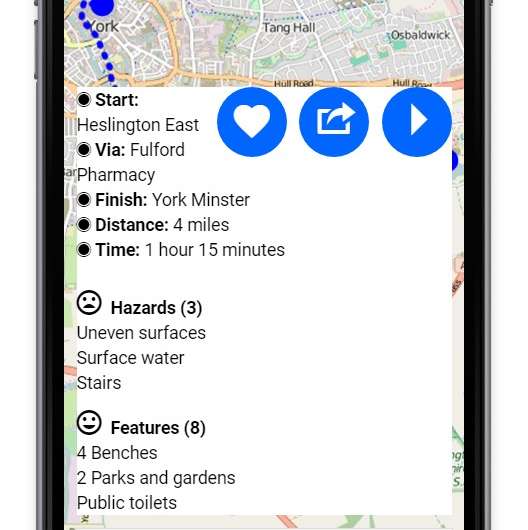New walking app could make later life healthier and happier

'Walking for Well-Being', a prototype app that makes it easy to plan less difficult, less demanding walking routes, could help people to stay fit, active and independent as they get older.
Accessible via mobile phone or tablet, it is one of the innovations developed and tested by new research that set out to produce practical, low-cost mobility aids encouraging older people to get out and about and to sustain healthy lifestyles.
The University of York led the research, funded by the Engineering and Physical Sciences Research Council (EPSRC) under the Lifelong Health and Wellbeing initiative. The Arts and Humanities Research Council (AHRC) and Economic and Social Research Council (ESRC) provided additional funding.
By highlighting steep slopes, uneven pavements, busy roads and other challenging features that can then be avoided, 'Walking for Well-Being' could be used to support people who want to visit friends, access shops and use local services and facilities. It could also highlight green spaces and other features that would make a walking route more pleasant and enjoyable.
Figures from Age UK have shown that 9 per cent of older people in the UK (around 900,000) feel trapped in their own home, while around 6 per cent (nearly 600,000) leave their house once a week or less.
Designed to help tackle this major social problem, the prototype app has been developed using information gathered through co-design workshops with older people, reflecting their needs and preferences. The aim is now to develop the app further for widespread uptake.
Other innovations developed by the project team include a prototype mobility scooter attachment incorporating sensors that measure the quality of the user's journey, including the smoothness of surfaces the scooter moves over and surrounding air and noise quality. This work has provided new insights into the travel experiences of mobility scooter users and the eventual aim is to work with charitable, healthcare and other organisations to improve mobility scooter design.
The project has pinpointed the need for the general public to realise how their behaviour (such as parking on pavements or not vacating priority seats on buses) can create difficulties for older or disabled people and deter them from going out and staying mobile. The team has also worked with older people to identify solutions for specific mobility problems that they were experiencing on their journeys. Surveys were then undertaken with a wider cross-section of people to see if these solutions would bring other benefits or might cause unexpected problems. This month, in conjunction with the First York bus company, specially commissioned poems conveying key messages highlighted by the process are being displayed on buses across the city, to raise awareness and encourage behaviour change.
Dr Mark Bevan of the Centre for Housing Policy at the University of York, who has led the overall project, says: "We've worked with around a hundred people in later life, listening to their needs and learning about the day-to-day challenges they face, especially after a big change in their lives such as losing a partner or giving up driving. Participants discussed many of the things that would help improve getting out and about in later life, and also helped co-design new tools to encourage mobility. In the context of an ageing population, it's crucial to find creative ways of helping older and disabled people to negotiate the built environment without spending big sums on redesigning or adapting it."
















